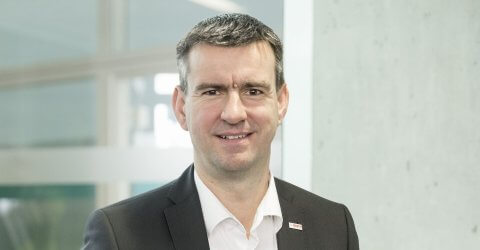Veronica Martin spoke to Dr. Thomas Pauer, President of Powertrain Solutions Division, Robert Bosch GmbH during Bosch Tech Day 2023 about the role of hydrogen in the global energy landscape, Bosch’s approach to ensuring the safety of hydrogen and how Bosch is working towards reducing its cost.

Can you tell us about Bosch’s perspective on the role of hydrogen in the global energy landscape and its potential to address sustainability challenges?
We see hydrogen as one of the energy carriers of the future. We need a storage system because we cannot do everything out of direct regenerative energy. Everything will be electrified in the future, but we will not be able to cover it always directly from solar and wind. Sometimes it’s winter, sometimes the wind is not blowing, and the sun is not shining. Then, we need some kind of storage in between. Hydrogen is the perfect solution for that. That’s why we have invested in hydrogen. If we want to get rid of co2, we have to go away from crude oil. Hydrogen is the best molecule in the chemical system that we can use for the storage of energy.
Bosch has been actively involved in partnerships and collaborations related to hydrogen. Could you highlight some key partnerships and collaborations that Bosch has engaged in to promote the development and adoption of hydrogen technologies?
On the usage side of the hydrogen value chain, let us first have a look at the stationary fuel cell systems. There, our partner for the development of the fuel cell and stack technology is Ceres in the United Kingdom. We have a good cooperation for many years now.
Another partner is PowerCell, a Swedish company. With them, we have developed the first generation of our fuel cell stack for mobile applications. It’s a startup company that has developed that kind of technology for years. Our part now is to provide the industrialization technology and the mass production competence. So therefore, it’s also a very good fit.
The UAE is hosting COP28 this year, with a strong focus on sustainability. How do you see the UAE’s commitment to sustainability impacting the adoption and development of hydrogen technologies in the region?
If we look at hydrogen, the world is separated in several regions which act differently at the moment. We see China having a clear strategy towards hydrogen in mobility. Therefore, there are subsidies, hydrogen hubs, and we see a lot of interest in truck manufacturers towards hydrogen as a solution for their mobility of the future. In the US, the Inflation Reduction Act (IRA) is a subsidy program that boosts the introduction of these kind of sustainable technologies towards the markets. Hydrogen will be getting much cheaper in the future and this will boost the industry.
In Japan, there’s also a clear trend from governmental side towards hydrogen. They have a partnership with Australia building ships to transport green hydrogen from Australia to Japan. As a global company, we act individually on each market and adapt to the local circumstances.
The UAE has the great opportunity having sun and wind nearly every day. From that point of view, probably we don’t need subsidies there as well. There are a lot of financially sound companies that can invest into these new technologies. Our aim is to find partners to bring up an ecosystem for hydrogen.
Safety is a critical aspect when it comes to handling hydrogen. Could you discuss Bosch’s approach to ensuring the safety of hydrogen technologies and infrastructure?
Safety is a must in all technical systems and this also applies for hydrogen systems. We have solutions for all safety relevant functions, using special kind of sensors and technologies to keep everything under control. No one has to be afraid about a hydrogen vehicle. You can see this already today on the road. There are vehicles all around the world and nothing has happened so far.
The cost of hydrogen production and its competitiveness with other energy sources are important factors for its widespread adoption. How is Bosch working towards reducing the cost of hydrogen technologies and making them more economically viable?
Every new technology starts with a higher price level than existing technologies. Step by step, by developing new features and also new functions, we bring costs down. We have shown this in conventional injection equipment and other powertrain systems. We can reduce costs, for example, also by reducing the amount of precious metals in the stack or components which you need for such a system. In addition, we have to overcome the starting point. With higher volumes, we can bring costs down with our industrialization know-how, and automation.
Then, we can reach the tipping point where a hydrogen fuel cell truck can be cheaper than a diesel truck with regards to total cost of ownership. Certainly, hydrogen itself as a fuel then must also get cheaper. Today it’s more than 9 euro per kilogram. In the future, it may go down to three to four euro.
Looking ahead, what are Bosch’s future plans and strategies in the field of hydrogen and what milestones do you hope to achieve in the coming years?
First of all, we now can celebrate the market launch of our fuel-cell power module. Next, we want to scale, but that will need some time and depends on market demand. It’s like the chicken and egg theory. If hydrogen stays at nine euro per kilogram, no one will buy a hydrogen truck. If no one buys a hydrogen truck, the hydrogen will not get cheaper. But we see that several countries plan to invest into hydrogen production to bring the costs down.
With lower costs for hydrogen and the technology, the tipping point will come between 2030 and 2035. This will also be supported by new legislation. In Europe, from 2035 and 2040 onwards, the CO2 footprint of trucks must be reduced. In the logistics area, there’s legislation as well. This will also be a push towards new technologies. We do expect large numbers in the next decade.





